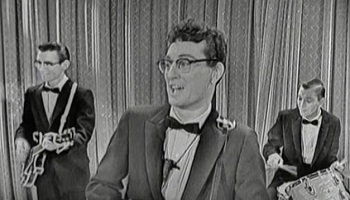
Buddy Holly Net Worth Today How His Music Continues to Generate Wealth
Buddy Holly, whose life was tragically cut short in a plane crash in 1959, is still regarded as one of the most influential figures in the history of rock and roll. Despite his short-lived career—spanning only a few years—his musical legacy has endured for decades, with his music continuing to resonate across generations. In fact, Buddy Holly’s net worth today serves as a testament to the lasting impact of his work. The question is: How does a rock icon, who passed away over six decades ago, continue to generate wealth?
In this blog post, we’ll explore how Buddy Holly’s music continues to earn money through royalties, merchandise, film, and other channels. We’ll also take a closer look at his legacy and how his estate ensures that his contributions to music remain profitable to this day.
The Rise of Buddy Holly: A Rock Icon’s Journey
Buddy Holly was born in 1936 in Lubbock, Texas. By his teenage years, he had already begun to develop a strong interest in music, learning to play the guitar and developing his own style. After initially dabbling in country music, he moved into rock and roll in the mid-1950s and formed the band “The Crickets.” Holly’s sound, which fused rock, pop, and rhythm and blues, quickly earned him a reputation for innovation. With hits like “That’ll Be the Day,” “Peggy Sue,” and “Everyday,” Buddy Holly became one of the most influential figures in early rock music.
Holly’s style had a significant impact on later artists, including The Beatles, Bob Dylan, and Elvis Costello. His ability to blend catchy melodies with heartfelt lyrics changed the way musicians approached songwriting. Holly’s musical career was cut short when he died in a plane crash at the age of 22. Despite this, his contributions to rock music have ensured his place in music history.
Buddy Holly’s Net Worth Today
Buddy Holly’s net worth today is estimated to be between $10 million and $20 million, despite his untimely passing at such a young age. While it is impossible to pinpoint the exact value of his estate due to the ongoing nature of his music royalties and other income streams, several factors continue to contribute to his wealth today.
The continuing success of Buddy Holly’s music is thanks to a combination of factors: the evergreen appeal of his catalog, strategic management of his intellectual property, film portrayals, and merchandise sales. While Buddy Holly may no longer be here to enjoy the spoils of his musical legacy, his estate ensures that his wealth continues to grow.
Royalties from Music Sales and Streaming
Even after his death, Buddy Holly’s music continues to generate substantial royalties. His catalog, including timeless songs like “That’ll Be the Day,” “Rave On,” and “Oh Boy!,” is still played on radio stations, streaming platforms, and in movies. This means that every time his songs are streamed on services like Spotify or Apple Music, or aired on the radio, the estate of Buddy Holly receives a share of the revenue.
In recent years, Buddy Holly’s music has found a new life on digital streaming platforms, with fans both young and old discovering his sound. These platforms pay artists or their estates a share of the revenue each time a song is played. Given the sheer number of plays that Holly’s hits still accumulate, it’s clear that his estate continues to benefit financially from these ongoing royalties. In addition, Holly’s albums have been re-released in deluxe formats over the years, boosting sales and ensuring that his legacy remains strong.
Buddy Holly in Film and Television
Buddy Holly’s image and music have found their way into numerous films, documentaries, and television shows, significantly contributing to his net worth. Perhaps the most famous portrayal of his life came with the 1978 film The Buddy Holly Story, starring Gary Busey. The film, which dramatized Holly’s rise to fame and tragic death, reignited interest in his life and music, resulting in increased sales and royalties for his estate.
Additionally, Holly’s music has been used in countless movies and TV shows. For example, his song “Everyday” featured in the 2011 film The Perks of Being a Wallflower, and his classic hit “That’ll Be the Day” has appeared in various TV series, including The Simpsons and Friends. Each time these songs are used in a commercial, film, or TV show, Buddy Holly’s estate benefits, further contributing to his long-term financial success.
Merchandise and Licensing
Buddy Holly’s image has become synonymous with early rock and roll, and his likeness continues to be used on merchandise ranging from T-shirts to posters, making him an enduring cultural icon. His estate has licensed his image for use in a wide variety of products, helping maintain his financial relevance decades after his death.
Several brands have capitalized on Buddy Holly’s iconic look, and his image often appears in collections that commemorate the rock and roll era. Vintage posters and limited-edition memorabilia related to Buddy Holly regularly surface in auctions, with some fetching significant sums. This merchandise not only ensures that his memory lives on but also continues to generate income for his estate.
The Management of the Buddy Holly Estate
After Buddy Holly’s death, the management of his estate became a key factor in maintaining and growing his wealth. Holly’s estate is managed by a combination of his surviving family members and legal representatives, who work hard to protect and grow his financial legacy.
In the years following Holly’s death, his estate was embroiled in legal disputes over control and the distribution of royalties. However, over time, the management of his intellectual property and rights was streamlined under proper legal stewardship, ensuring that his music and legacy remained financially viable.
One key aspect of the estate’s strategy has been the careful management of Buddy Holly’s copyrights. As an artist who wrote many of his own songs, Holly retained the rights to his music, which has proven to be a lucrative asset. Even as more time passes, these rights continue to generate significant income, especially as his music is still widely enjoyed and used in various media.
Buddy Holly’s Impact on Modern Music and Culture
Buddy Holly’s influence on modern music cannot be overstated. His innovative approach to rock and roll set the stage for the likes of The Beatles, The Rolling Stones, and countless other artists who would dominate the music scene in the 1960s and beyond. Even more, Holly’s image and persona continue to inspire artists, filmmakers, and fashion designers.
The Beatles, for example, frequently cited Buddy Holly as a major influence on their sound, and John Lennon even stated that Holly’s death had a profound impact on him. The Beatles’ manager, Brian Epstein, worked hard to make sure that their early sound reflected some of the same raw, youthful energy that Holly had brought to rock and roll.
Moreover, Buddy Holly’s persona as the “rock star nerd” has made him an endearing figure for many fans. His trademark thick glasses became part of his signature look, and in recent years, they have been celebrated as an essential part of his image. The continued appreciation for Holly’s style and personality has allowed his brand to remain relevant in today’s fashion and pop culture.
Buddy Holly’s Legacy in the Rock and Roll Hall of Fame
Buddy Holly’s induction into the Rock and Roll Hall of Fame in 1986 was a significant milestone in cementing his legacy as a rock and roll pioneer. As one of the earliest inductees, Holly’s influence on the development of rock music was recognized, and his place in history was ensured. Since then, his legacy has only grown, with new generations discovering his music and paying homage to his influence on the genre.
The Rock and Roll Hall of Fame continues to celebrate Buddy Holly’s contributions to music through exhibits, tributes, and the continued performance of his songs by modern artists. These efforts ensure that his contributions to the world of music and entertainment are always remembered and appreciated.
The Timeless Wealth of Buddy Holly’s Music
Buddy Holly may have left us far too soon, but his music continues to transcend time and generations. His influence on rock and roll remains undeniable, and his legacy continues to generate wealth for his estate, ensuring that his impact will never be forgotten. Through royalties, merchandise, licensing, and film appearances, Buddy Holly’s estate remains financially strong, benefiting from the ongoing appreciation for his music.
Today, Buddy Holly’s net worth is a reflection of not only his artistic brilliance but also the careful management of his legacy. His songs remain a staple of rock and roll, and his image continues to inspire fans and artists alike. As long as his music continues to be celebrated, Buddy Holly’s financial triumph will endure, proving that even the briefest careers can leave an indelible mark on both culture and wealth.



